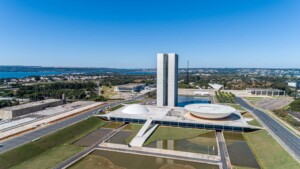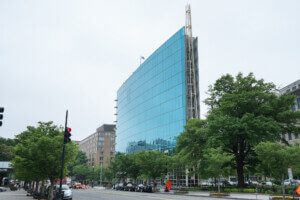As a former New York City real estate tycoon, President Donald Trump has long been accustomed to having his surname prominently slapped on and splashed across a globe-spanning multitude of buildings—residential towers, hotels, casinos, and on—either directly developed and owned by his eponymous company or branded by it through licensing deals.
Trump, however, may not enjoy that same high level of name exposure within the built environment as it pertains to his status as the (potentially twice impeached) 45th President of the United States as Representative Joaquin Castro, a Democrat from Texas, announced late last week that he plans to draft legislation that would prohibit Trump’s name from ever gracing a federal building or property in the future.
Castro, who supports the immediate impeachment of Trump as the clock runs out on his presidency, announced the planned legislation on January 8, two days after a deadly insurrection was staged by fervent Trump supporters of all stripes—many of them known QAnon conspiracy theorists and white supremacists—at the U.S. Capitol.
In addition to supporting the impeachment and removal of Donald Trump, I am also preparing legislation that would prohibit any federal building or property from being named after President Donald J. Trump.
1/2
— Joaquin Castro (@JoaquinCastrotx) January 8, 2021
President Trump incited an insurrection that damaged some our nation’s most significant and sacred federal property.
Most importantly – let us learn from our past.
Donald Trump should never become a future generation’s confederate symbol. 2/2
— Joaquin Castro (@JoaquinCastrotx) January 8, 2021
Continuing in their tradition of gentle brotherly ribbing on social media, Rep. Castro’s twin brother Julian Castro—a former Secretary of Housing and Urban Development (2014-2017), erstwhile Mayor of San Antonio (2009-2014) and presidential hopeful during the 2020 election cycle—piped in to say it was his idea.
It would seem that prohibiting the name of a former president from being used at a federally-owned property, be it an administrative office building or an airport, comes without precedent. While the names of—and most notably monuments to—numerous historical American political figures associated with bigotry and oppression have, as alluded to by Castro, come down over the last several months as part of a nationwide push against racial injustice, no other Commander In Chief in the history of the modern presidency has been subject to a proactive name-banning. (Numerous Trump-branded properties, largely condo developments but also the ice skating rink at Central Park, have removed signature signage over the past several years as the Trump name shifts from luxury-signaling attribute to tenant-shedding liability.)
Disgraced former President Richard Nixon is, of course, someone with very few buildings named after him—save for his own presidential library and a small smattering of schools—although he was not subject to a formal federal building-naming ban leading up to his resignation from office. Although Nixon resigned before his impeachment, modern presidents who have been formally impeached have gone on to have federal buildings named after them. The Washington, D.C. federal office complex that’s now home to the United States Environmental Protection Agency was renamed after former President Bill Clinton—like Trump, he was impeached by the House of Representatives and acquitted by the Senate–in 2013 by the General Services Administration.
Castro’s legislation, if passed, would likely serve as a massive blow to an internationally famous real estate developer who, as mentioned, is accustomed to seeing his name stamped onto buildings and would undoubtedly greatly relish in seeing federal properties bear the Trump moniker down the road as a testament to his legacy. But a potential Donald J. Trump Federal Office Building in D.C. is already highly unlikely, legislation or not, and Trump has more pressing, property-related concerns on his plate including yesterday’s announcement that the PGA has pulled its 2002 Championship from Trump National Golf Course in Bedminster, New Jersey.
“We find ourselves in a political situation not of our making,” Seth Waugh, the CEO of the PGA of America, told NJ.com in a phone interview. “We’re fiduciaries for our members, for the game, for our mission and for our brand. And how do we best protect that? Our feeling was given the tragic events of Wednesday that we could no longer hold it at Bedminster. The damage could have been irreparable. The only real course of action was to leave.”
In response to the decision, the Trump Organization, which has profited immensely from the federal government during the Trump presidency, issued a statement claiming the move to be in “breach of a binding contract” and that the PGA has “no right to terminate the agreement.”
“As an organization we have invested many, many millions of dollars in the 2022 PGA Championship at Trump National Golf Club, Bedminster,” continued the statement. “We will continue to promote the game of golf on every level and remain focused on operating the finest golf courses anywhere in the world.”











